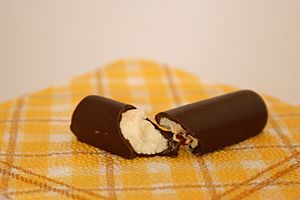Túró Rudi facts for kids
Túró Rudi is the name of a curd snack which has been popular in Hungary since 1968. The bar is composed of a thin chocolate-flavored outer coating and an inner filling of túró (curd). The "Rudi" in the product name comes from the Hungarian "rúd", which translates to rod or bar (and is also a nickname for the name "Rudolf"). Túró Rudi can be made in several different flavours and sizes.
The basic (plain, "natúr") bar is cheaper and more popular and comes in two sizes: the classic 30-gram (1.1 oz) bar and the large ("óriás", giant) 51 g (1.8 oz) bar. There are differently-flavoured varieties of the bar, like apricot, strawberry and raspberry as jams in the túró, but coconut and vanilla are aromas. Also nut and caramel flavours are available. The plain bar can be found with dark chocolate outer coating.
The "pöttyös" (spotty or spotted with polka dots) theme is part of the marketing scheme of the bar, and the distinctive red polka-dots are readily associated with Túró Rudi by regular consumers. Friesland Hungária, Inc. (which claims to be the manufacturer of the "original" Túró Rudi) released its product in Slovakia, Romania, Spain and Italy under the name DOTS in 2003. The version sold in Western Europe is said to be sweeter and comes with a milk-chocolate coating to suit the taste of locals.
Its first public appearance was in a Hungarian family film, Kismaszat és a Gézengúzok (roughly translated to Little Smear and the Scapegraces) in the 1980s.
The bar is best kept refrigerated around 4 °C (39 °F). The regular 30-gram bar and the óriás bar usually retail for about 95 Hungarian forints (about 30 euro cents) and 140 Hungarian forints (about 45 euro-cents), respectively.
Origin
The earliest form of Túró Rudi appeared in Russia under the name Cырок (Syrok meaning syr-cheese curd snack), a rectangular bar of curd, butter and fat mixed together, covered with dark chocolate coating. Its coating is thinner and the filling is sweeter. It is widely acknowledged that Túró Rudi was based on it, as design and production began after a study trip to the Soviet Union (presumably by Antal Deák). Sándor Klein, a teacher at the Budapest University of Technology, gave the product its name. The name stayed, and throughout the 1970s the candy proved both popular and successful. Production moved from Budapest to Mátészalka and eventually grew to several additional factories throughout the 1980s.
Different versions
The original Túró Rudi has gone through many changes during the years, and many different manufacturer has its own Túró Rudi product. Opinions on which of them is the best usually vary a lot. Although the brand name is legally owned by Pöttyös, a few manufacturers claim that their product is much closer to the "original" Túró Rudi, mainly because it contains real túró (curd) and other unspecified "dairy products" or pickled vegetable fats.
International versions
Austria
The Austrian company Landfrisch has also started selling its version of the bar, admittedly copied from the original Túró Rudi, under the name Landfrisch Rudi.
The 'Landfrisch Rudi' is also coated with chocolate, unlike its Hungarian predecessor, and in addition to the 'plain' version, it's also sold in vanilla and coconut flavors, and has been awarded an Innovation prize at the 2005 Anuga international food trade fair. It is also available in India.
China
In China, a copy of the product has been sold since October 2008 under the name Túró Kiittyy (Image).
Poland
In Poland, Danone is distributing the product originally known as Danone Túró Rudi under the trademark Danio Batonik.
Russia
In Russia, as well as in many post-Soviet states, the original version of the product can still be found in a rectangular and slightly softer form, which, again, is sweeter than the Hungarian one.
Japan
Although there are no known instances of similar products in Japan, several Japanese visitors to Hungary have started a website dedicated to show their love for Túró Rudi.
Culture
- Túró Rudi, from the name Rudolf, is the name given to the Red Baron in the Hungarian translation of the Richard Scarry children's books.
- The Hungarian band 100 Folk Celsius have a song about Túró Rudi.
- There is a short movie titled Túró Rudi by János Kellár



